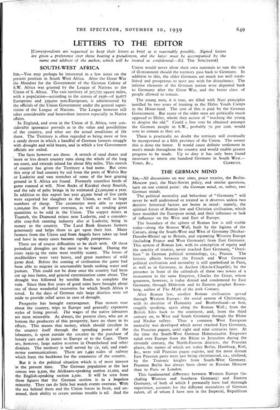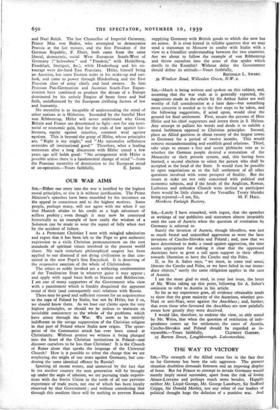THE GERMAN MIND Sta,—All discussions on war aims, peace treaties,
the Berlin- Moscow pact, the Nazi-Soviet policy, and similar questions, turn on one central point : the German mind, or, rather, two German minds.
The political mentality and behaviour of " Germany " will never be well understood or treated as it deserves unless two decisive historical factors are borne in mind : namely, the spiritual forces of Roman law and Christian civilisation, which have moulded the European mind, and their influence or lack of influence on the West and East of Europe.
The boundary of the sphere of Roman law is still visible today—along the Roman Wall, built by the legions of the Caesars, along the South-West and West of Germany (Neckar- Danube-Rhine) up to Britain, and separating Western Europe (including France and West Germany) from East Germany. This system of Roman law, with its conception of equity and the sanctity of treaties, never reached East Germany, " Ostcl- bien " in German political terminology, i.e., Prussia. The historic affinity between the French anti West German political civilisation and mentality is still symbolised in Paris, as well as in Germany, in Aachen (Aix-la-Chapelle), by the presence in front of the cathedrals of these two towns of a monument to the same Emperor, Charles the Great, whose greatness, however, is today denied and condemned by East Germany, through Hitlerism and its Eastern prophet Rosen- berg, author of The Myth of the zoth Century.
After Roman law, another Roman civilisation spread through Western Europe: the social system of Christianity, with its doctrine of Humanity and Brotherhood—at first, roughly speaking, again along the Roman Wall ; from the British Isles back to the continent, and, from the third century on, to West and South Germany through the Rhine and Neckar valleys. Thus a common West European mentality was developed which never reached East Germany, the Prussian pagans, until eight and nine centuries later. At the time the South-West German Hohenstaufen Emperors ruled over Europe from the Rhine to Jerusalem during the eleventh century, the North-Eastern districts, the Prussian places, the names of which are today Berlin, Hamburg, Kid, &c., were still Prussian pagan regions, and the more distant East Prussian parts were just being christianised, i.e., civilised, by the Teutonic knights from South-West Germany. Prussian Berlin has always been closer to Russian Moscow than to Paris or London.
This fundamental difference between Western Europe (in- cluding Western and Southern Germany) and Eastern Germany, of both of which I personally have had thorough experience, accounts for the different mentalities of German rulers, all of whom I have met in the Imperial, Republican and Nazi Reich. The last Chancellor of Imperial Germany, Prince Max von Baden, who attempted to democratise Prussia at the last minute, and the first President of the German Republic, F. Ebert, both came from the same liberal, democratic, social West European South-West of Germany (" Schwaben " and " Franken," with Heidelberg, Frankfurt, Stuttgart, &c.), while Hindenburg and his en- tourage were die-hard East Prussians. Hitler, himself being an Austrian, has some Eastern traits in his make-up and out- look, and came to power through Hindenburg and the East Prussian class of army chiefs and land owners. In him Prussian Pan-Germanism and Austrian South-East Expan- sionism have combined to produce the dream of a Europe dominated by his unholy Empire of brute force and bad faith, uninfluenced by the European civilising factors of law and humanity.
No mentality is as incapable of understanding the mind of other nations as is Hitlerism. Seconded by the baneful Herr von Ribbentrop, Hitler will never understand why Great Britain and France are determined to fight—not for any terri- torial or economic gain, but for the ends of law against law- lessness, equity against injustice, common weal against egotism. This is beyond the grasp of Hitler, whose principles are, " Right is my might," and " My nationalist selfishness overrides all international good." Therefore, what a leading statesman after a long discussion with Hitler stated a few years ago still holds good: "No arrangement with Hitler is possible unless there is a fundamental change of mind "—from the Prussian mentality of domination to the European mind
of co-operation.—Yours faithfully, E. JACKH.





































 Previous page
Previous page